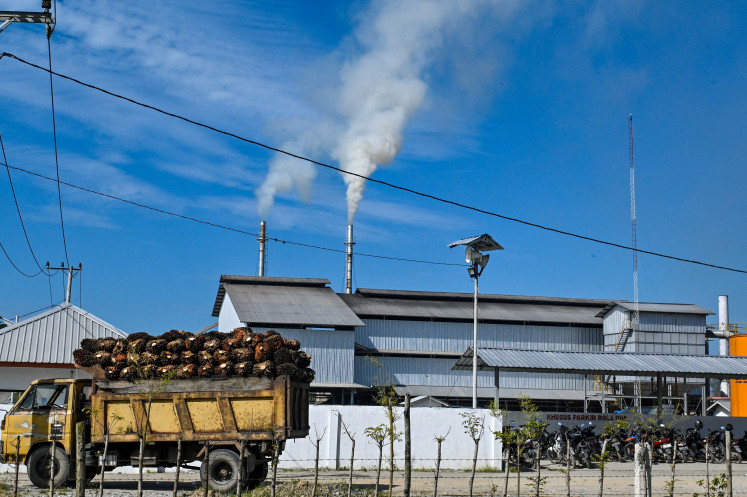Popular Reads
Top Results
Can't find what you're looking for?
View all search resultsPopular Reads
Top Results
Can't find what you're looking for?
View all search resultsRI's growing relations with CIS countries: How far can they go?
Happy birthday Mr
Change text size
Gift Premium Articles
to Anyone
H
span class="caption">Happy birthday Mr. President: Then president Susilo Bambang Yudhoyono (front, right) plays guitar while singing 'Happy Birthday' to Russian President Vladimir Putin (left) on the sidelines of the Asia-Pacific Economic Cooperation (APEC) Summit at the Hotel Sofitel, Nusa Dua, Bali, in October 2013, as other regional leaders watch on. Over the past 10 years, relations between Indonesia and Russia have improved rapidly, with a good rapport between the top brass of the two countries. Courtesy of the Presidential Office/Abror Rizki
Many of us did not notice how rapidly relations between Indonesia and Commonwealth of Independent States (CIS) countries had grown in recent years. Six out of nine CIS countries, four of them between 2005 and 2013, have opened embassies in Jakarta, while Indonesia has four embassies in the region.
The year 2014 witnessed a flurry of activity in the relations between Indonesia and the CIS countries. High-level visits, continuous negotiations to sign new agreements to boost cooperation in various areas, increased trade from year to year and people-to-people exchanges were some of the highlights of these growing ties.
The demise of the Soviet Union in the early 1990s led to the birth of numerous new states in Central Asia, the Caucasus and Eastern Europe. Some of these states formed the CIS: the Russian Federation, Kazakhstan, Uzbekistan, Azerbaijan, Belarus, Moldova, Tajikistan, Kyrgyzstan and Armenia are all current members of the CIS.
With a combined population, based on Word Bank data, of 227 million people ' compared with Indonesia's 250 million ' and a combined GDP of US$2.56 trillion, the CIS countries offer numerous opportunities to Indonesia, which can export goods like tea, coffee, palm oil, furniture, rubber, tires, paper, garments, electrical goods and electronic spare parts to these countries, while importing oil and gas, defense equipment, chemicals and machinery from them.
Most of these CIS countries consider Indonesia a land of opportunities, given its large population and abundant natural resources.
Indonesia considers CIS countries, which are small in size ' except Russia ' as non-traditional markets and useful friends on the international stage.
But the question is whether Indonesia can really benefit from the growing relations with CIS countries.
It is true that most Indonesians have either never heard of small countries like Armenia, Tajikistan and Kyrgyzstan, or know very little about them.
Indonesia has to act according to its national interest and seek a quality relationship with CIS countries.
President Joko 'Jokowi'Widodo recently stated, rightly, that Indonesia's diplomacy must be people-oriented and focus more on countries that provide benefits to us.
'For me, 'free and active' is making friends with countries that can provide us with benefits. What's the point of making friends if we are always on the losing end?' Jokowi asked recently.
'What's the benefit of making friends if it is aimed merely at image-building and if it risks our national interests? It does not mean that we're creating enemies. It just means we won't be close with countries providing no benefit to Indonesia.'
Many CIS countries do not fulfill Jokowi's criteria. Only Russia, Azerbaijan, Kazakhstan and Belarus are useful markets for Indonesia. Last year, the trade between Indonesia and Russia surged to $3.52 billion, a huge increase from $774.88 million in 2009. Besides oil and gas products, Russia supplies Sukhoi SU-27/30 fighter jets, MI-171 helicopters and BMP-3F amphibious infantry fighting vehicles to Indonesia.
The case of Azerbaijan, which opened an embassy in Jakarta in 2005, has been a success story. The small oil-rich state has emerged as an important oil supplier to Indonesia. Currently, Baku supplies around 10 percent of Indonesia's oil needs. Bilateral trade in 2013 jumped to $1.74 billion from $757.44 million in 2009.
There are bright prospects in countries like oil- and resources-rich Kazakhstan, the biggest economy in Central Asia, and Belarus. Russia, Kazakhstan and Azerbaijan have significant foreign exchange (forex) reserves that they may invest in Indonesia.
Indonesia's two-way trade with all CIS countries reached $5.47 billion ' exports of $961.85 million and imports of $4.51 billion ' in 2013. That means Indonesia suffered a trade deficit of $4.51 billion last year. Indonesia imported oil and gas products worth $2.26 billion from Azerbaijan and Russia and the remaining imports were chemical products, food items, defense equipment and heavy machinery.
Based on Jokowi's foreign policy doctrine, Indonesia must review its relations with small countries like Armenia, whose bilateral trade with Indonesia was just $3.70 million in 2013, Kyrgyzstan (bilateral trade $2.23 million), Tajikistan ($1.5 million) and Moldova ($8.41 million). They may not provide significant benefits to Indonesia.
On Dec. 16, the ambassadors of Georgia and Armenia told House of Representatives Deputy Speaker Fadli Zon that Indonesia must open embassies in Tbilisi and Yerevan on a reciprocal basis. Apparently, Indonesia has no major interest in opening embassies in these two countries.
Last year, Indonesia's then House speaker Marzuki Alie asked the government not to open its embassy in Armenia until the Nagorno-Karabakh issue is solved.
In the present geo-political and economic situation, Indonesia may not reap windfall benefits from CIS countries and bilateral relations may remain stagnant, though the opportunities are there. In 2015, Indonesia must continuously engage these CIS countries in line with our national interests and benefits with an aim to boost exports to these non-traditional markets and increase essential imports from Russia, Kazakhstan, Azerbaijan and Belarus.










